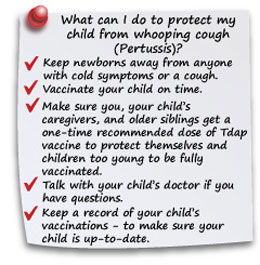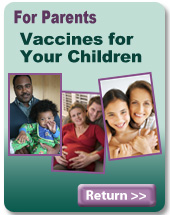Whooping Cough (Pertussis) - Fact Sheet for Parents
Diseases and the Vaccines that Prevent Them
Español: Tos ferina (pertussis)
Printer friendly version[483 KB, 2 pages]
Benefits of DTaP Vaccine
- Saves lives.
- Protects young children from serious disease.
- Keeps others safe.
Side effects of the DTaP vaccine
- The most common side effects are usually mild and occur in about 1 out of 4 children. They include:
- Redness, swelling, and pain from the shot.
- Fever.
- Vomiting.
- A fever over 105 degrees occurs in about 1 child out of 16,000 children.
- Nonstop crying for 3 hours or more occurs in about 1 child out of 1,000 children.
- Seizures (jerking or staring) occur in about 1 out of 14,000 children. The seizures do not cause long-term harm.
- Serious reaction to the DTaP vaccine occurs in fewer than 1 in a million children.
What is whooping cough?
Whooping cough—or pertussis—is a very serious respiratory (in the lungs and breathing tubes) infection caused by the pertussis bacteria. It causes violent coughing you can’t stop. Whooping cough is most harmful for young babies and can be deadly. The DTaP vaccine protects against whooping cough.
What are the symptoms of whooping cough?
Whooping cough starts with the following symptoms:
- Runny or stuffed-up nose
- Sneezing
- Mild cough
- A pause in breathing in infants (apnea)
After 1 to 2 weeks, coughing, which can be severe, starts.
- Children and babies can cough very hard, over and over.
- When children gasp for breath after a coughing fit, they make a "whooping" sound. This sound is where the name “whooping cough” comes from. Babies may not make this sound.
- Coughing fits make it hard to breathe, eat, drink, or sleep. Coughing fits happen more at night.
- Babies and young children may turn blue while coughing from lack of oxygen.
- Coughing fits can last for 10 weeks and sometimes recur with the next respiratory illness.
How serious is whooping cough?
The disease is most dangerous for babies and young children. From 2004 through 2010, there were 148 deaths from whooping cough reported in the U.S. Almost all the deaths-135 of the 148-were babies 3 months and younger.
More than half of babies younger than 1 year who get the disease need care in the hospital. About 1 out of 5 babies and children with whooping cough will get pneumonia (a serious lung infection). Whooping cough can also cause seizures (jerking or staring) and brain damage.
How does whooping cough spread?
Whooping cough spreads easily through the air when an infected person breathes, coughs, or sneezes. A person can spread the disease while he or she has cold-like symptoms and for at least 2 weeks after coughing starts.
Many babies and young children get whooping cough from adults or older brothers or sisters who don’t know they have the disease. Pregnant women with whooping cough can give it to their newborn babies. Because whooping cough is so harmful in babies, everyone around them needs to be vaccinated—to make a circle of protection.
Booster vaccine for pre-teens and adults continues protection from whooping cough
Protection from the DTaP vaccine for babies and young children decrease over time. When this happens, a person is at risk for getting and spreading whooping cough.
A one-time booster vaccine called Tdap for pre-teens and adults helps people stay protected against the disease.
Pre-teens should get the Tdap vaccine at 11 or 12 years of age. Adults and teens who didn’t get the Tdap vaccine as pre-teens also should get it. This is very important for families and caregivers of babies.
Pregnant women should get the vaccine preferably during their third trimester or late second trimester (after 20 weeks gestation). If not vaccinated during pregnancy, then they should get the vaccine right after delivery, before they leave the hospital.
What is the DTaP vaccine?
The DTaP vaccine is a shot that combines the vaccines for whooping cough (pertussis) and two other serious diseases: diphtheria and tetanus. The DTaP vaccine protects children by preparing their bodies to fight the bacteria.
Most children (about 89 children out of 100) who get all doses of the DTaP vaccine will be protected from whooping cough. But, protection from DTaP vaccine decreases over time. Some children who are vaccinated do get the disease, but it is usually a milder case.
Why should my child get the DTaP vaccine?
Getting your child the DTaP vaccine helps protect him against whooping cough. It also protects other people who can’t get the vaccine—especially newborn babies, who can get very sick and die from whooping cough.
When should my child get the DTaP vaccine?
Children should get five doses of the DTaP vaccine at the following ages for best protection:
- One dose each at 2 months, 4 months, and 6 months;
- A fourth dose at 15 through 18 months; and
- A fifth dose at 4 through 6 years of age.
It is safe to get the DTaP vaccine at the same time as other vaccines, even for babies.

If my child does not get the DTaP vaccine, will he get whooping cough?
Almost everyone who is not immune to whooping cough will get sick if exposed to it. Before the whooping cough vaccine, about 8,000 people in the U.S. died each year from the disease. Today, because of the DTaP vaccine, this number has dropped to fewer than 50.
Cases of whooping cough have been increasing over the past several years and outbreaks of whooping cough can occur. We don’t know exactly why the number of cases is increasing, but we think it’s a combination of many different reasons. Doctors and nurses are more aware of pertussis and recognize it more often, the ways we test for the disease have gotten better, and more of the bacteria may be circulating.
In 2010, whooping cough made more than 27,000 people sick. Twenty-five babies died. Many of these babies were too young to be fully protected against whooping cough. Several states had outbreaks of whooping cough.
Is the DTaP vaccine safe?
The DTaP vaccine is very safe, and it is effective at preventing whooping cough (and two other diseases: diphtheria and tetanus). Vaccines are like medicines, and any medicine can have side effects. But severe side effects from the DTaP vaccine are very rare.
How can I learn more about the DTaP vaccine?
To learn more about the DTaP vaccine or other vaccines, talk to your child’s doctor.
Call 800-CDC-INFO (800-232-4636) or go to the CDC Vaccines web site and check out the following resources:
- Pertussis (Whooping Cough) - What You Need to Know
- Infant Immunizations FAQs
- Vaccines website for parents
Fact Sheets for Parents
Diseases and the Vaccines that Prevent Them
![]() This symbol means you are leaving the CDC.gov Web site. For more information, please see CDC's Exit Notification and Disclaimer policy.
This symbol means you are leaving the CDC.gov Web site. For more information, please see CDC's Exit Notification and Disclaimer policy.
Copyrighted images: Images on this website which are copyrighted were used with permission of the copyright holder and are not in the public domain. CDC has licensed these images for use in the materials provided on this website, and the materials in the form presented on this website may be used without seeking further permission. Any other use of copyrighted images requires permission from the copyright holder.
Contact Us:
- Centers for Disease Control and Prevention
1600 Clifton Rd
Atlanta, GA 30333 - 800-CDC-INFO
(800-232-4636)
TTY: (888) 232-6348 - New Hours of Operation
8am-8pm ET/Monday-Friday
Closed Holidays - cdcinfo@cdc.gov




